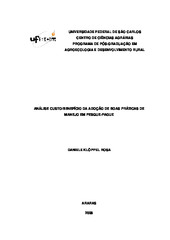Análise custo/benefício da adoção de boas práticas de manejo em pesque-pague
Resumen
Fish culture is na aquaculture field which has been growing a lot in the last few years, specially by fish capture stagnation and for the growing high nutritional quality animal protein demand. A market field that has been greatly developed since 1990 s and which holds huge transactions of buying and selling alive cultures fish is the fee fishing activity, moving not only São Paulo fish cultures but from other states too, like Paraná, Mato Grosso do Sul and Minas Gerais. However, as in any human activity, it has negative and positive impacts. On this perspective, this study has objected, through an environment assessment evaluation in five fee-fishing units located in Araras region, manage the proposition Best Management Practices (BMP s) use and making a cost/benefit analysis to prove the viability of those practices use. Data were collected through a previous prepared questions and fishing pounds water and sediment samples analysis and water quality parameters measures in three different moments: before, during and after the rainy period. The analysis showed there are lead and iron elements excess in water, the former is due to previous lead contamination in Mogi-Guaçu hydrographical basin, and the last one because of the region soil type. Several Best Management Practices (BMP s) were proposed and the cost/benefit analysis identified only one economic viable establishment, whereas under a 9.5% a year discount rate in a 15-year analysis, it s proved to be profitable. The studied fee-fishing units presented serious problems on economic sector, and should in an urgent way improve their administrative and management strategies in order to better explore the property potentialities and the activity the execute in a sustainable manner.
